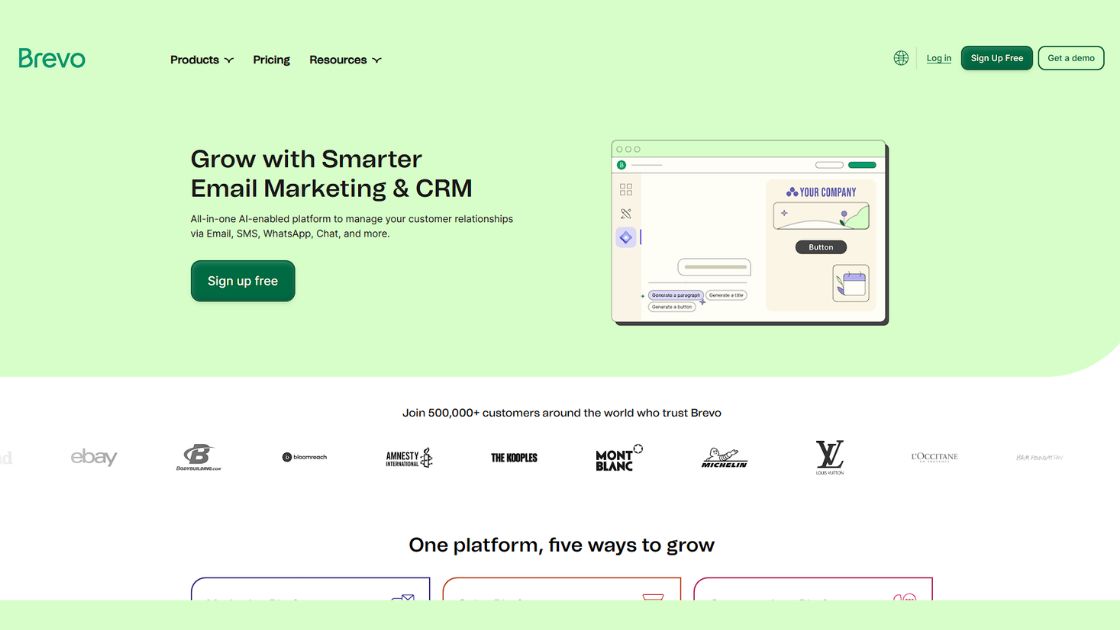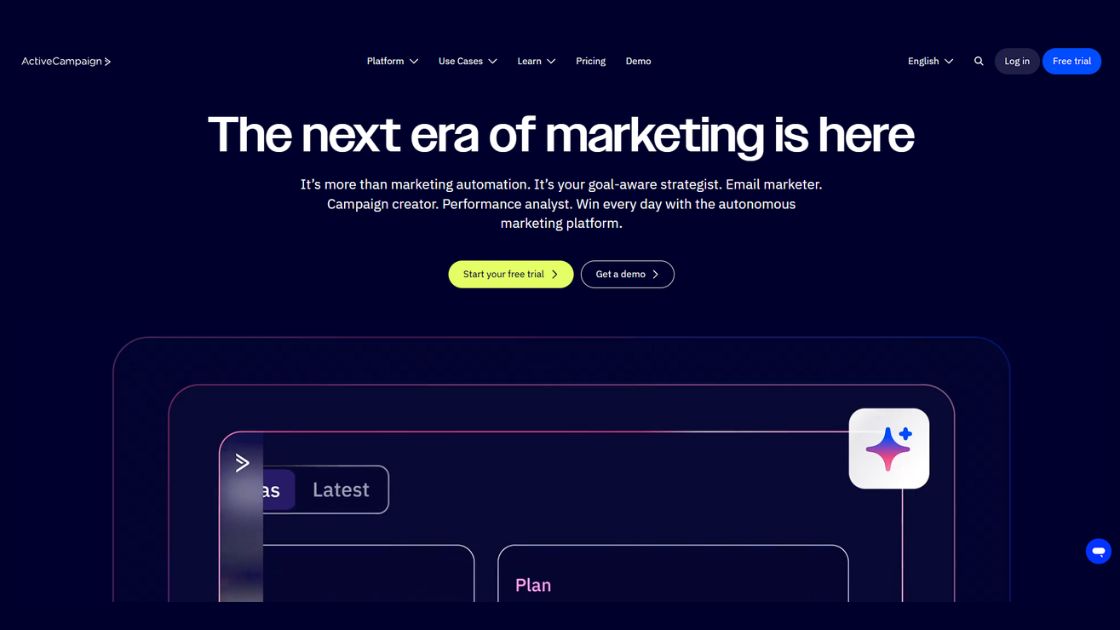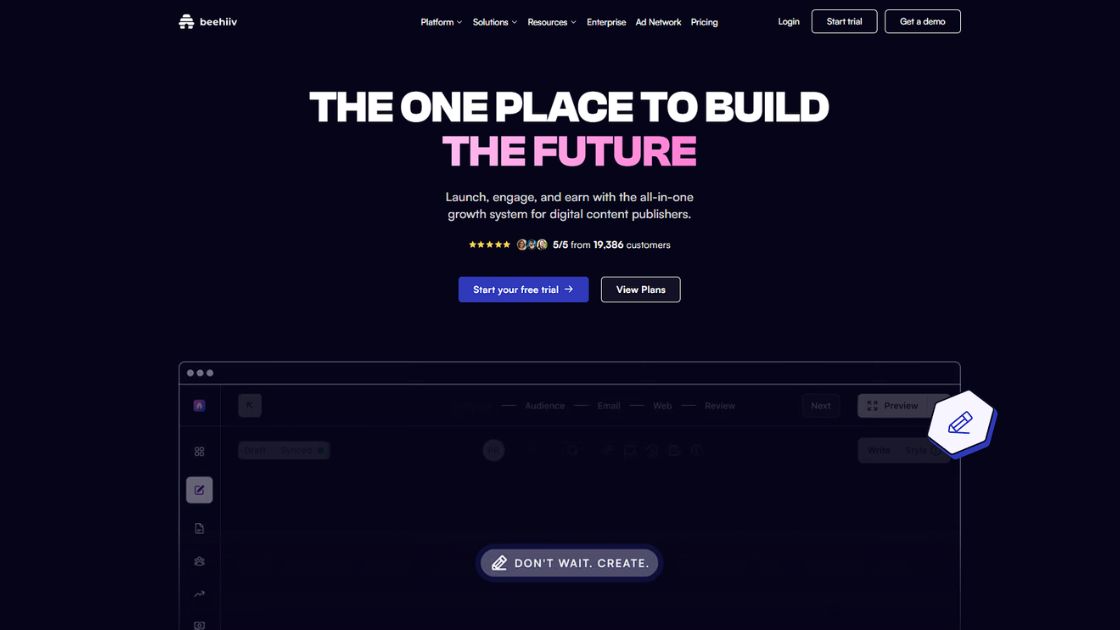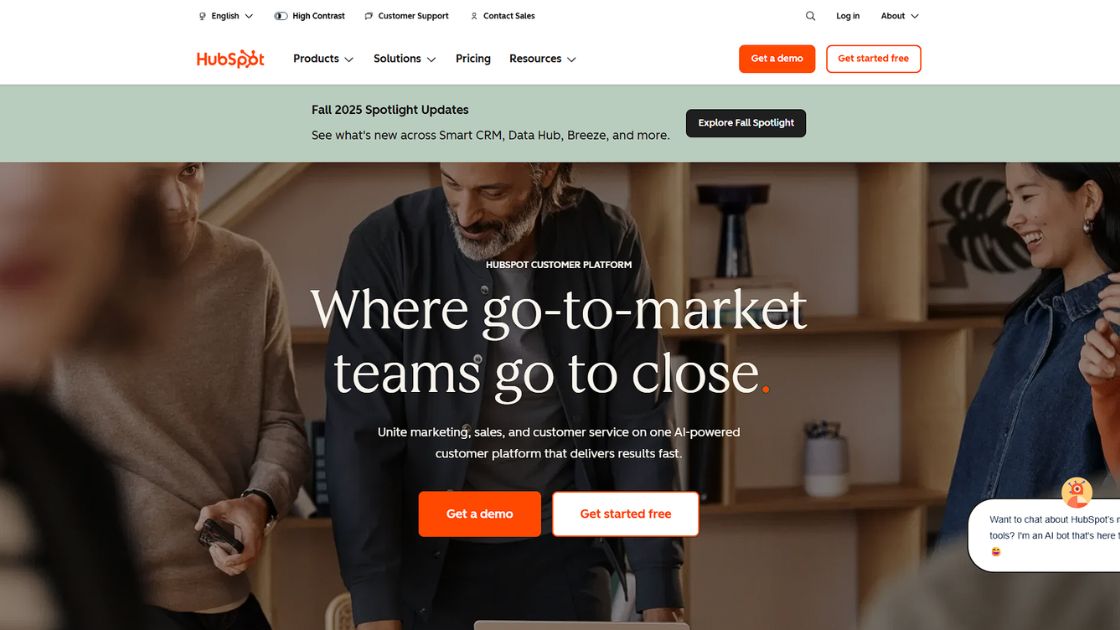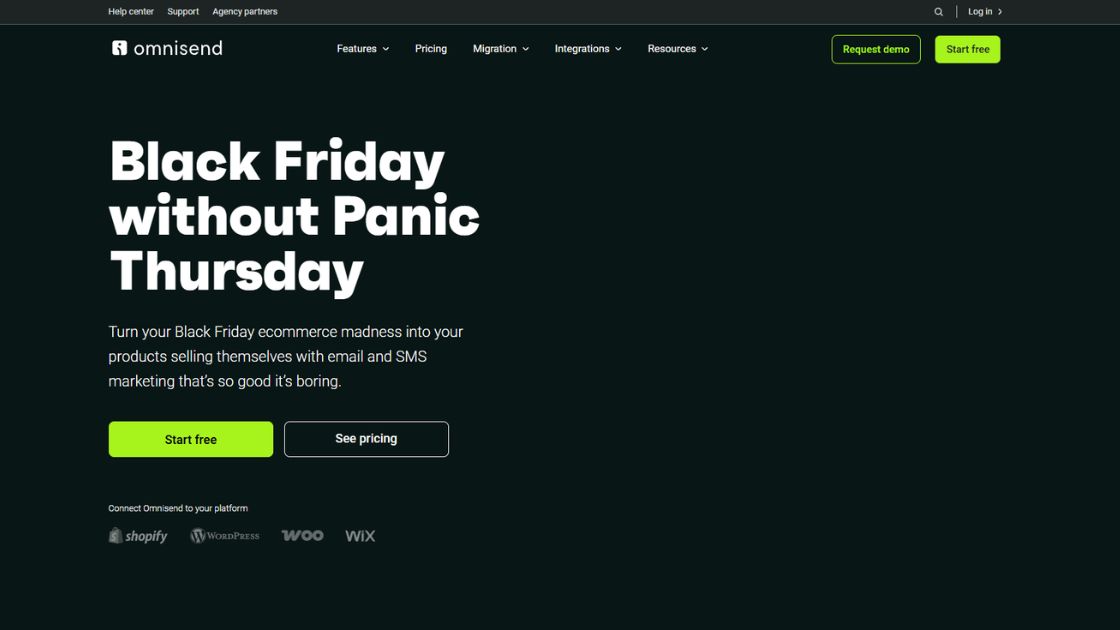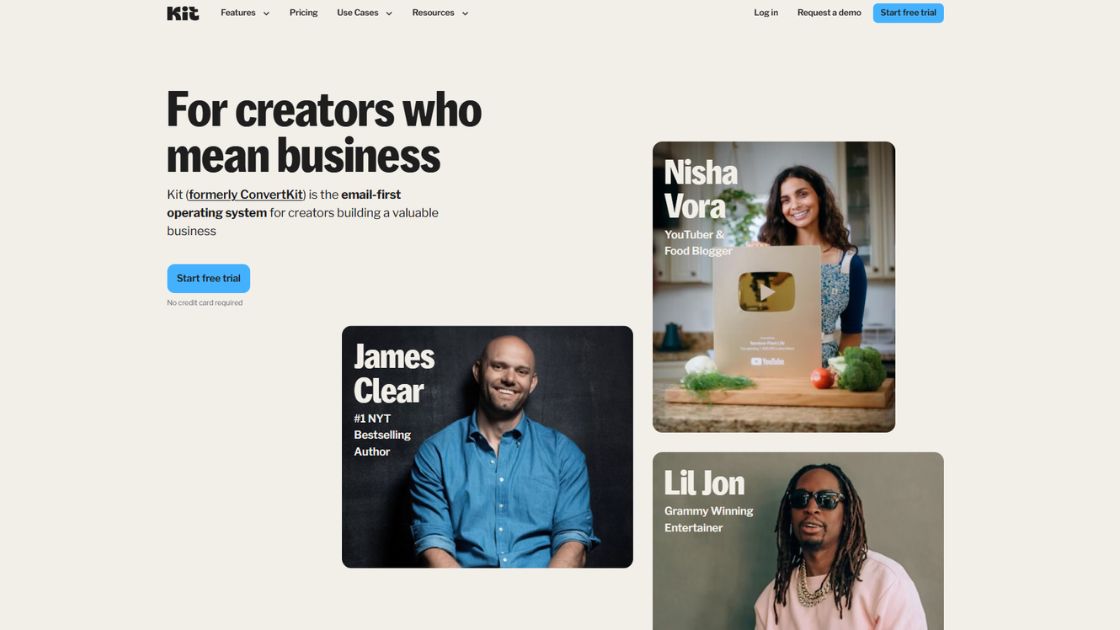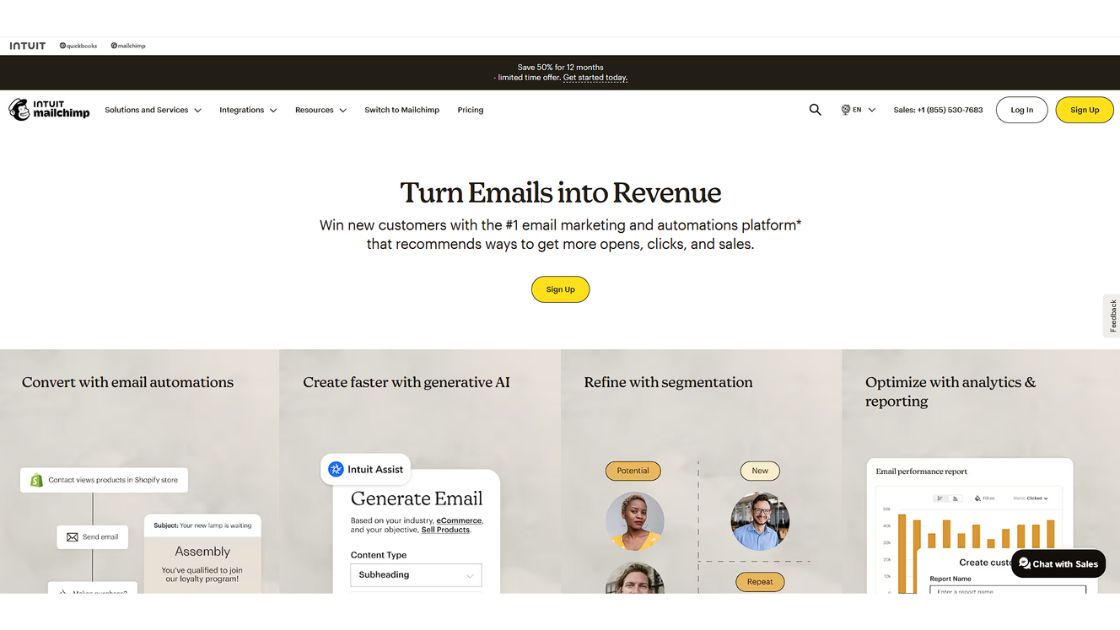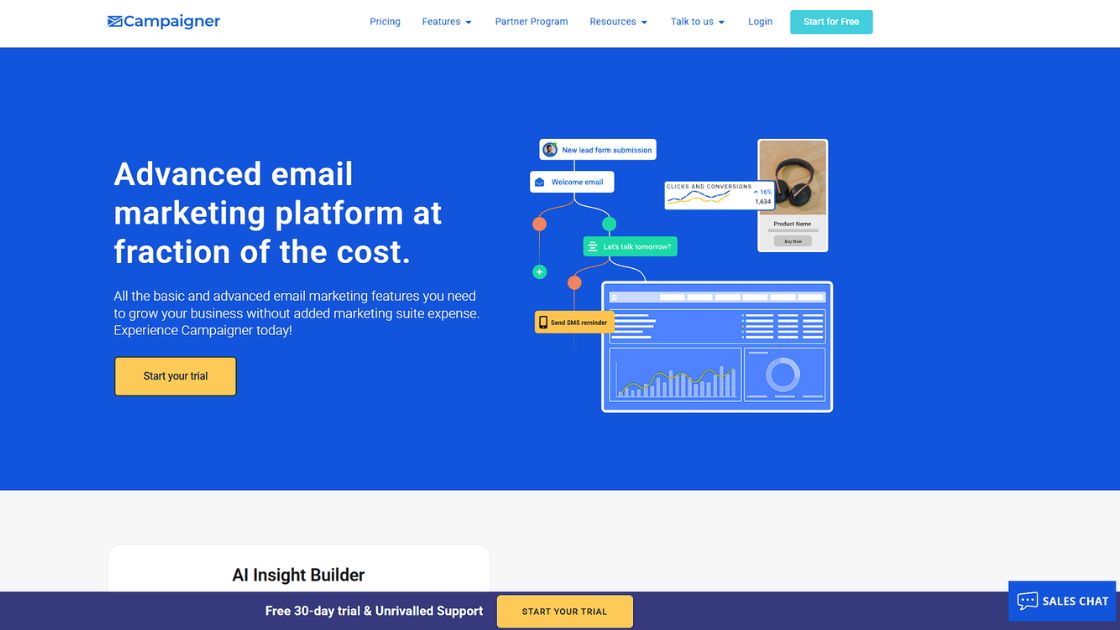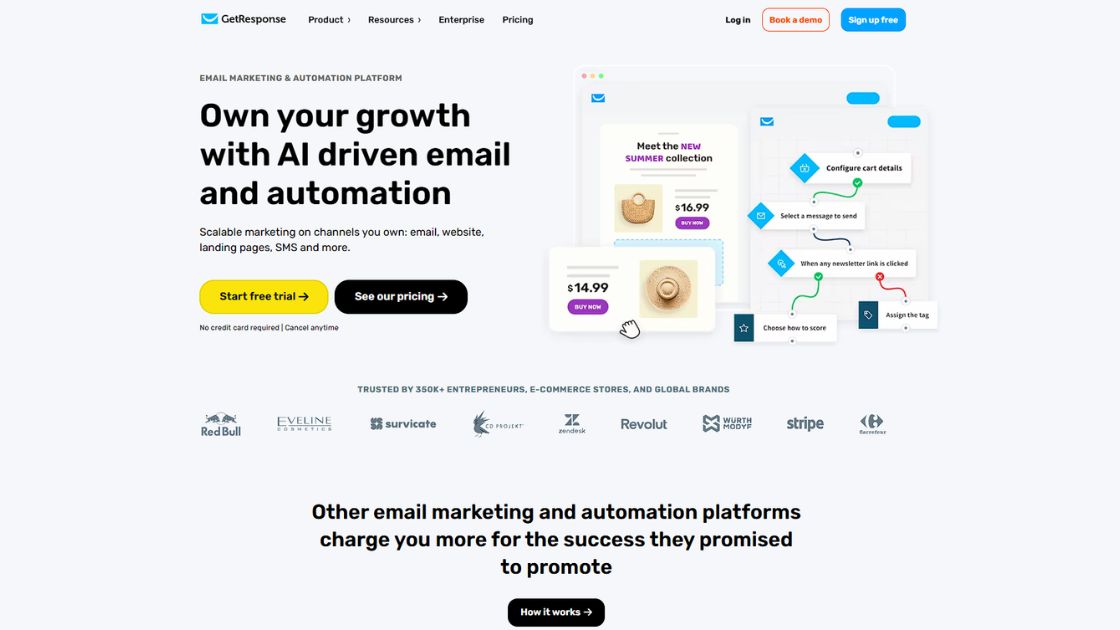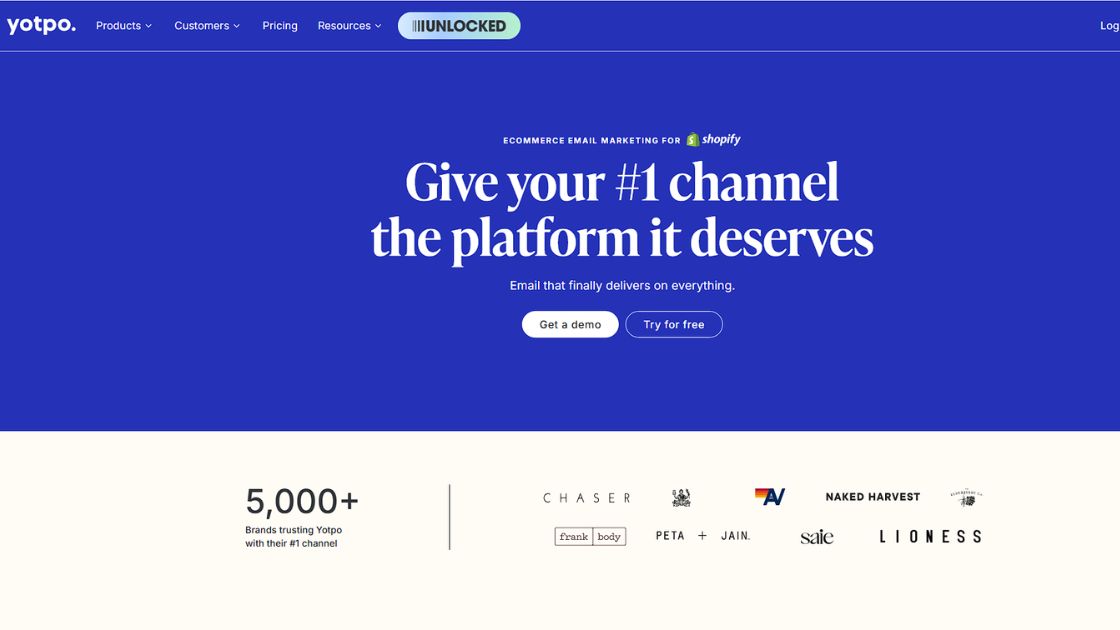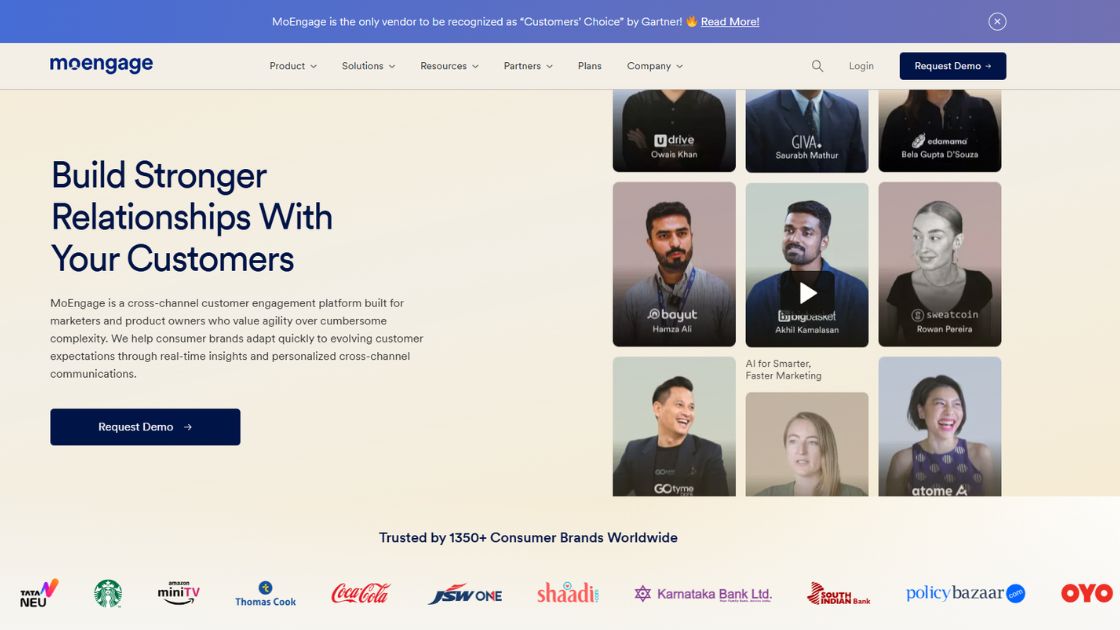Are you in a hurry? Well, the most adequate email marketing services to choose from in 2025 include Mailchimp (best SMB), ActiveCampaign (best automation), HubSpot (all-in-one CRM), and Omnisend (best ecommerce). To use cost-efficient alternatives, we can recommend MailerLite and Moosend!
One of the most effective marketing tools that you can possess as a marketer is email. There are so many platforms, and finding the right platform is just like finding a needle in a pile of hay in the digital world. But you do not need to fear anything; we have now made it easy for you to choose the right one. There is no doubt, 2025 has been a long journey with email marketing, featuring exciting new features and modest layouts that cater to all users, from novices to die-hards.
But all you have to do is have an assistant who will not only help you to design gorgeous emails, but who will also take care of your campaigns and let you know about the numbers. This may sound dreamy to you. But you need to expand your business or reach more customers without all this overhead. There is a system that is waiting anxiously to assist you.
The following are some of the most popular email marketing players in the world in 2025!
What are Email Marketing Platforms?
Suppose you have a magic instrument that ensures you communicate directly to the inboxes of your customers, besides sending the messages that are timely, relevant and absolutely personal. That is precisely what an email marketing platform would do for you!
Using the most user-friendly drag-and-drop editors and a few ready-made templates, you can design campaigns which look professional and can be used on any device.
Yet it is not only beautiful emails that do this.
The real thing is that these templates or platforms help you send the right message to the right audience at the right time. You can simply organise and personalise your emails so that they sound like one-to-one communication.
With the best free email marketing platforms 2025, everything will be running just on autopilot mode!
As results matter a lot, these platforms help you track every click, open, and sale, so you know exactly what is working as per your expectations.
In short, email campaign software converts your ideas into simple conversations while also turning contacts into valuable customers. This all allows you to convert your campaigns into growth.
Why Your Business Needs the Best Email Marketing Platform in 2025 for Maximum ROI
Email marketing is still one of the most effective digital marketing channels in 2025, with the average ROI of about 40 dollars per dollar spent. However, the biggest success is the use of the proper platform that will suit your business needs and objectives.
Best Advantages of a Good Email Marketing Software
In all businesses, significant customer relationships remain at the level of foundation. It assists you in segmenting your target audience so that appropriate messages are relayed to the appropriate persons and at the appropriate times.
Powerful automation features allow you to scale leads with personalised customer journeys and less hands-on input. Newer systems provide advanced, modern analytics which reveal how engagement, revenue and conversions are driven by messaging as well. These data-driven approaches optimise strategy and commitment in real-time.
Plus, with professional templates and design tools, your emails will look nice across all your devices, while delivery features help your emails avoid the spam folder and make it to the intended recipient.
What Is an ‘Ideal’ Platform for Your Business
It really depends on your business needs. You want to look at big picture factors such as budget limits, number of subscribers, integration capability with your current tools and features that make sense (like pro segmentation, e-commerce processing, and A/B testing.
Another important factor is scalability. There is no data migration with the selected email marketing tool, and it is set to enhance your business. Also, the interface would have to be easy to use, especially if several teams are building their own campaigns. Always go for platforms providing solid customer support, training and thorough docs.
The Ultimate Impact on Business Expansion
You must absolutely invest in the right email marketing platform to better your bottom line. Not only streamlines your marketing work, but it also increases customer retention rates and gives granular insights into customer trends.
The automation capabilities of these email marketing tools help your team to focus on creative and strategy development with no repetitive tasks.
Down the line, the best email marketing platform for your business is one that meets your business objectives and requirements. It should also support ambitious growth while also offering the best returns on your investment.
Top 18 Best Email Marketing Platforms to Use in 2025
Let us have a quick look at the top email-marketing platforms you can choose from as per your needs –
-
MailerLite
MailerLite is ideal for small business owners who want to start with and send professional campaigns using a basic but powerful tool. It has a clean and easy-to-use drag-and-drop editor and over 90+ ready-made templates, which ensure that email creation is fast and painless. In addition, it has landing pages, forms and even a simple web builder, all user-friendly.
Pricing
- Free plan has 1,000 subscribers and 12,000 emails/month
- Paid plans start at $9/month.
Recommended for
Small, midsize companies, and beginners who want quite stable automation and no complexity.
Features
- Effective automation processes
- Welcome emails
- Segmentation
- Abandoned cart
- Forms
- Landing pages
Deliverability or Support
Typical email deliverability and live chat responsive support.
Integrations
Provides the basics, but not the width and breadth, like some competitors.
User Ratings
The ease of use, as well as excellent value at the price, is enjoyed by users.
Advantages
- Generous free plan
- Affordable
- Easy to use automation
- Self-service
- Easy to implement
Disadvantages
- The choice of languages is limited
- Does not offer as high a level of automation as some of the best tools do.
-
Brevo
This is an all-in-one small business marketing platform that includes SMS and CRM, not just emails, which is great if you’re looking for a multi-channel solution. It is easy to use, too, with a drag-and-drop editor. However, its template selection is a little simple. The free plan that Brevo gives is the difference-maker, where you can send up to 300 emails per day to the equivalent of 100,000 contacts, which is very generous.
Pricing
- 300 emails/day are free
- Paid subscriptions start at $8.08/month for 5,000 emails.
Suitable for
Small businesses and e-commerce startups seeking email, SMS and CRM.
Functionality
- Marketing automation
- Transactional email
- Multichannel campaigns
- Web tracking
Deliverability or Support
Good deliverability with helpful support.
Integrations
The service is good for working with e-commerce and CRM applications.
User Ratings
The product is applauded for its great value and power channels, but a few users complain that the UI is too slow.
Advantages
- Free with excellent variations
- Multichannel marketing
- Affordable
Cons
- Fewer templates
- Slow-performing user interface
- Some e-commerce specific automations
-
ActiveCampaign
ActiveCampaign is the best option when it comes to companies that require more automation and CRM integration. It is responsive to dynamic customer journey requirements and sales-marketing convergence with 900-plus workflow designs. Each has descriptions of their 240+ templates, drag-and-drop email and landing page designs.
Pricing
Plans start with a 14-day free trial and begin at $15 per month.
Best use
Agencies, ecommerce businesses and SMBs where close automation and CRM integration are needed.
Traits
- In-depth automation
- AI predictive analytics
- CRM
- Segmentation
- Goal tracking
Deliverability or Support
Good deliverability, good support.
Integrations
General, including CRM, e-commerce and sales software.
User Ratings
Good with experienced users, but beginners may find it difficult to learn concepts initially.
Advantages
- Strong automation
- CRM
- Powerful segmentation
- Artificial intelligence
Disadvantages
- Higher learning curve
- Manual reporting may be tedious to set up.
-
Beehiiv
Beehiiv focuses on creators and businesses looking to grow and monetise newsletters. It provides clean, theme-oriented newsletter editing with AI writing tools and sophisticated audience growth tools like referral programs. Paid features allow you to run paid subscriptions and sell advertising directly in newsletters.
Pricing
- Free (10,000 subscribers)
- Paid begins at $43/month
Best suited
Creators, bloggers, and businesses that solely focus on newsletters and want to generate money.
Functions
- Newsletter editor
- Artificial Intelligence writing applications
- Referral programs
- Advertisement network
- Analytics
Deliverability or Support
Excellent deliverability and engagement analytics.
Integrations
Pleasant integration with payment and subscriber management.
User Ratings
Loved by the creators because of its growth and monetisation capabilities.
Pros
- Advanced growth options
- AI-based editor
- Several monetisation options
Cons
- More expensive than a lot of platforms
- Heavy emphasis on newsletters
-
Moosend
Seriously feature-rich for your money, Moosend gives you a lot for a little. It also has an easy-to-use drag-and-drop editor, with more than 25 triggers and web behaviour tracking for personalisation, making automation powerful. Being an economical alternative to the majority of marketing automation tools available in the market, Moosend provides all its pro features under a single plan; thus, the pricing is not complicated and is affordable.
Pricing
500 contacts will cost $7/month to begin with
Ideal for
Small businesses that desire high-end automation but do not wish to pay the high costs.
Practicability
- Polished automation
- Tracking web
- Segmentation
- Landing pages
- Forms
What you can expect
Customer support and good deliverability
Integrations
Works with a large number of e-commerce and CRM platforms.
User Ratings
Loved for value, ease of use and depth of automation.
Pros
- All pro functions are there
- Great cost
- High automation
- Personalization capacity
Cons
- No free plan
- Not as widely recognised a brand as some larger rivals
-
HubSpot
HubSpot is a massive single CRM and marketing software that operates a little more than email marketing. The tool is the best in situations where companies would like to have a cohesive integration of sales, marketing and service units. The email creation system, such as drag-and-drop, automation, personalisation, and detailed analytics, works together with the CRM to enable you to gain ultimate control over customer experiences.
Pricing
The platform offers a free version with limited features, starting at $20/month.
Perfect fit
Medium and large companies that need high-end CRM integration and multi-channel campaigns.
Features
- Pipeline management
- Lead scoring
- Marketing automation
- Customised email flows
Deliverability/Support
Excellent deliverability, recognised customer service, phone service and chat.
Integrations
500+ third-party applications, including ecommerce and social applications.
User Reviews
The cross-team functionality in the tool is commended, and is also more costly and complicated, according to users.
Advantages
- Built-in CRM and marketing system
- A great level of automation
- Numerous integrations
Cons
- It is hard to learn
- Requires more money to buy more advanced tools
-
Omnisend
Omnisend is a marketing automation tool designed specifically to fit e-commerce-based brands. It is one of the cheapest email marketing tools for small businesses that provides an opportunity to combine email, SMS, and push notifications into a unified automation workflow. Its Shopify-specific features, such as product pickers and review management, help online stores increase sales through targeted and behaviour-triggered campaigns.
Pricing
- $16/month starting
- Free plan available
Perfect for
Ecommerce brands and small/large online retailers
Features
- Multi-channel campaigns
- Product suggestion
- Customer life-cycle tracking
Deliverability/Support
Strong deliverability, 24/7 chat support
Integrations
Shopify, BigCommerce, WooCommerce and other deep integrations
User Ratings
Great for e-commerce, not much for CRM
Pros
- Omnichannel marketing
- Simple automation set-up
- E-commerce focus
Cons
- Not very customisable or out of the box
- Lacks a built-in product page builder
-
AWeber
AWeber is an established and very easy-to-use email marketing tool with a drag-and-drop editor and a wide selection of templates. The tool also offers more than 600 ready-to-use, customisable templates. Its claim to fame is the smart designer, which smartly generates branded templates based on your website.
Pricing
- Starting at $12.50/month
- Free plan available
Best for
Small businesses and solopreneurs that value design and simplicity
Key features
- Basic automation
- Canva integration
- Autoresponders
Deliverability/Support
Great deliverability and support
Integrations
All that + over 750 integrations (think ecommerce, social media – you name it)
User Ratings
Beautiful design but basic automation
Pros
- Good and smart branding tools
- Easy use
- Great variety of templates
Cons
- Automation is not very sophisticated
- Conditional flows are limited
-
Kit (formerly ConvertKit)
Kit is designed for content creators such as bloggers and influencers and is focused on audience growth and monetisation. It also provides clean email and landing page editors, automation workflows, and a creator’s network for cross-promotion.
Pricing
- From $25/mo
- A free plan with limitations is available.
Best for
Creators, solo founders and small businesses who want to grow and monetise their audience.
Key features
- Advanced segmentation
- Paid subscriptions
- Referrals/sponsor networks
Deliverability/Support
Good deliverability, community-oriented support
Integrations
Payment gateways, audience management tools
User Reviews
Loved the creator-centric features, but it was more expensive than the basics.
Pros
- Monetisation features
- Simple automation
- Growth Tools
Cons
- Weak on customer relationship management
- Not all features are available in lower-end plans
-
Mailchimp
Mailchimp is not a lesser-known platform, especially where small businesses are stepping into the email marketing arena. It is one of the best free email marketing platforms 2025 that offers a friendly user experience to users, a visual journey creator and many integrations. However, the price is high and not as comprehensive as new instruments are automation solutions.
Pricing
- It starts at the cost of $13 / month
- A free plan is provided, but at present it is restricted.
Best fit
Startups and smaller companies are familiar with the brand, but with moderate budgets.
Perks
- Journey builder
- Creative studio
- Audience insights
Deliverability/Support
Fair deliverability, extensive internet support books.
Integrations
300+ integrations with e-commerce and social sites.
User Ratings
Mixed – convenient to use, cost and non-automation may upset users.
Advantages
- Popular brand
- Many integrations
- Easy-to-use branding tools
Cons
- Scales quickly
- No sufficient automation
- No free plan
-
Campaigner
Campaigner will better fit more complex marketing organisations that need advanced automation, list cleaning, and bulk mail capabilities. This is the best email marketing automation software that possesses reusable content blocks to be dynamically personalised.
Pricing
$59/month and a 30-day free trial.
Best adapted to
Big businesses that have volume marketing and complex processes.
Functionality
- SMS and email automation
- Reputation management
- Conversion tracking
Deliverability/Support
Good deliverability, helpful support.
Integrations
E-commerce and CRM systems.
User Ratings
Stable in high-volume campaigns but expensive.
Advantages
- Highly automated
- Segmented mass emailing
Drawbacks
- More costly
- UI is not as up to date as others
-
GetResponse
GetResponse is a scaled marketing hub. It is affordable, user-friendly and loaded with capabilities like funnel creation, webinars and AI-generated content.
Pricing
Starts at $ 19/month, with a free trial.
Perfect fit
Small to medium-sized businesses that need a versatile market platform.
Functionality
- Sales funnels
- Web test
- Landing pages
- Email editor
- Writing assistant
- AI writing assistant.
Deliverability/Support
Good deliverability, chat support 24/7.
Integrations
E-commerce and various CRM tools.
User-Ratings
Loved features and support, but with an ageing interface.
Pros
- Scalable tools
- Funnel builder
- Support of AI-generated content
Cons
- Part of the templates feels dated
- The interface is not that modern
-
Constant Contact
Constant Contact is ideal for businesses with event and other marketing needs. It provides solid social media tools, RSVP management capabilities and lead capture forms, but automation is basic.
Pricing
- From $12/month
- 30-day free trial available
Great for
Small businesses, not-for-profits, Event Promoters
Features
- Email & event marketing
- Landing pages
- Popups
- AI writing assistant
Deliverability/Support
Good deliverability, phone chipper and chat chipper
Integrations
Social media, event platform
User Reviews
Liked the simplicity and event features; wanted more automation.
Pros
- Event marketing integration
- Simple email & landing page builder
Cons
- Limited automation
- Segmentation concepts are a bit crap in comparison to others.
-
Benchmark Email
Benchmark is also reputed to be user-friendly to beginners with easy automation and a multilingual template library in more than 10 languages.
Pricing
Tier 1 is $13/month, and a free version is available.
Best used by
Small to medium-sized enterprises that seek ease and accessibility to the entire world.
Features
- Drag-and-drop
- Visual workflow builder
- Surveys
- Polls
Deliverability/Support
Good customer service, reliable delivery.
Integrations
Basic integrations are appropriate in small environments.
User Ratings
This is rated positively when it comes to ease of use, but in terms of design, the options are few.
Advantages
- Simple automation
- Support in different languages
- Quality of templates
Cons
- The design is less flexible
- Fewer complex automation possibilities
-
Yotpo Email
Yotpo Email is a sleek email marketing solution designed with ecommerce needs in mind, particularly for Shopify stores. It uses AI and UGC (user-generated content) such as reviews and social media content to deliver highly-personalised, data-powered email campaigns that drive engagement and conversions.
Pricing
- Competitive pricing with pay-for-what-you-send pricing that brings typical email costs up to 40% less.
- Free for less than 10 thousand emails per month.
Perfect for
E-commerce brands, D2C businesses, and Shopify store owners who wish to host powerful email+SMS marketing under one roof.
Features
- AI personalisation
- Automation
- Loyalty programme integration
- Real-time analytics
- Advanced segmentation
- In-built Canva
- Multi-channel builders
Deliverability
Great, with intelligent features to prevent spam and to optimise engagement.
Integrations
Strong integrations with ecommerce and CRM.
Support
White-glove onboarding; 1:1 growth strategists for email marketing ROI and success.
User Feedback
Users like its business-friendly pricing, integration with Shopify, and AI-based personalisation, though there are some occasional UI oddities.
Advantages
-
- Easy eCommerce automation
- Responsive templates
- Good for reviews + loyalty integration
Cons
- Limited design flexibility
- A few advanced automation options
-
Mailjet
Mailjet is a multifunctional email marketing utility that is characterised by the high-quality collaborative editing functionality and simplicity of use. It helps marketing and development teams to create, deliver and monitor mail campaigns in synchrony. Email creation is quick and accessible because of the drag-and-drop editor and pre-built templates, and its powerful API enables its use in transactional email. Automation provides the ability to create welcome series, follow-ups, etc, with a simple and powerful workflow builder.
Pricing
Free plan with 6,000 emails every month; Paid plan begins at approximately $9.65/month.
Best suited to
Small to medium firms and teams interested in cooperation in campaign building with marketing and developer attention.
Features
- Real-time collaboration
- Professional templates
- Transactional email API
- Email personalisation
- Automation workflows
Deliverability
Good deliverability, inbox tracking and spam checking tools.
Integrations
Works with CRM, CMS, and ecommerce solutions such as WordPress, Shopify, and Salesforce.
Support
Web-based email and chat support that has a lot of online documentation.
What users say
Liked due to its collaboration features with teams and its developer-friendly API, but the automation possibilities are relatively simple in comparison with the rivals.
Pros
- Simple automation workflows
- Multilingual support
- Solid email editor with templates
Cons
- Design flexibility is limited
- Basic automation only
-
Sendlane
Sendlane is ideal for e-commerce, digital product owners, and fast-growing companies looking for robust automation and multi-channel marketing. It provides sophisticated segmentation, funnels, real-time analytics, and AI-based recommendations to automate the campaigns. It’s a drag-and-drop editor with powerful support for complex workflows, and integrations for Shopify, WooCommerce, and CRMs, among others.
Pricing
- From $99/month
- No free plan
- Free-trial available
Best for
Ecommerce and SMBs that require robust automation and multichannel reach.
Features
- Behavioural tracking
- Cross-channel automation
- Cart recovery
- AI insights
Deliverability & Support
High deliverability, 24/7 phone/chat/email support.
Integrations
Extensive ecommerce and CRM integrations.
User Notes
Great for those with automation, but pricy compared to other options.
Pros
- Strong automation + segmentation
- User-friendly
- Good template variety
Cons
- No free plan (only trial)
- Less flexible design
-
MoEngage
MoEngage is an intelligent customer engagement platform, built for customer-obsessed marketers and product owners. It is also at the top among the best Mailchimp alternatives 2025 that brings together email, SMS, push notifications, and in-app messaging in ‘one place’ along with advanced segmentation and machine learning in order to empower personalised customer journeys that drive engagement and retention.
Pricing
- Custom plans with prices starting around $999/month for Entry-level tiers
- No free plan, but a free trial is available
- Pricing grows with monthly active users and usage.
Good for
Midsize to large organisations in retail, finance, health care, media, and education that require advanced, data-driven marketing automation.
Features
- Advanced behaviour segmentation
- Real-time personalization
- AI-powered recommendations
- Send-time optimization
- Cross-channel communication over email, SMS, push, in-app, and web message.
Deliverability & Support
Great deliverability with proactive monitoring and 24/7 support with onboarding support.
Integrations
Rich in integrations with ecommerce platforms, analytics tools, CRMs, and data lakes, e.g. Snowflake and Google BigQuery.
User Note
It is loved for its market-leading AI and automation features, and deep data integrations and support, though price and learning curve are factors.
Pros
- Cross-channel automation
- Multilingual support
- Decent templates
Cons
- Design is not highly flexible
- Can be slow in performance and costly
Comparison Table of Top Email Marketing Platforms in 2025
| Platform | Starting Price (USD / INR) | Free Plan? | Best For | Highlight |
| Mailchimp | $13 (~₹1,080) | Yes (500 contacts) | Small businesses, startups | All-in-one |
| ActiveCampaign | $19 (~₹1,580) | No | Advanced automation | Most Advanced |
| HubSpot (Marketing Hub) | $20/seat (~₹1,660) | Yes (basic tools) | Mid to enterprise CRM marketing | CRM Powerhouse |
| Brevo (Sendinblue) | $9 (~₹750) | Yes (300 emails/day) | Multichannel SMBs | Affordable Multichannel |
| Omnisend | $16 (~₹1,330) | Yes | Ecommerce retailers | Best Ecommerce |
| GetResponse | $19 (~₹1,580) | Yes (500 contacts) | Webinars & funnels | All-in-one Value |
| MailerLite | $10 (~₹830) | Yes (1,000 subscribers) | Startups & creators | Cheapest |
| ConvertKit (Kit) | $29 (~₹2,400) | Yes (1,000 subscribers) | Content creators & educators | Creator Favorite |
| Constant Contact | $12 (~₹1,000) | No | Nonprofits & SMBs | Beginner-Friendly |
| Zoho Campaigns | $3 (~₹250) | Yes (2,000 contacts) | Businesses in the Zoho ecosystem | Cheapest |
| Klaviyo | $20 (~₹1,660) | Yes (500 contacts) | Ecommerce personalization | Best Ecommerce |
| Moosend | $9 (~₹750) | Free trial only | SMBs & budget ecommerce | Cheapest |
| Mailmodo | $39 (~₹3,250) | Yes (2,000 emails/mo) | Interactive campaigns | AMP Innovation |
| Sender | $15 (~₹1,250) | Yes (2,500 subscribers) | Startups & freelancers | Cheapest |
| Yotpo Email | Custom pricing | No | DTC brands with the Yotpo suite | Loyalty + Reviews |
| Mailjet | $15 (~₹1,250) | Yes (200 emails/day) | Teams & developers | Collaboration |
| Sendlane | $100 (~₹8,300) | No | Scaling ecommerce stores | Premium Ecommerce |
| Benchmark Email | $13 (~₹1,080) | Yes (500 subscribers) | Beginners & nonprofits | Beginner-friendly |
What Factors Should You Look for in a Good Email Marketing Platform — In Depth (2025)
While choosing a good email marketing platform, you must know what features the platform should possess. Here is a quick yet detailed data for you.
User-Friendly Drag-and-Drop Email Editor
A drag-and-drop editor helps marketers to design beautiful campaigns without any knowledge of code. Find a solution that gives you full drag and drop functionality with a huge library of mobile-responsive, niche designs to really take your industry by storm!
The top platforms offer up content blocks for dynamic elements such as countdown clocks, polls, product recommendations, and social media feeds for added engagement.
Better Segmentation and Hyper-Personalisation
Today’s consumers demand timely, useful information. Segmentation must be more than basic demographics, like behavioural triggers, purchase frequency, engagement patterns, and AI-generated predictive scoring, which are all factors that will give you a closer view of the right customer segmentation for your campaign.
Dynamic customisation can update the text, imagery and offer of the email based on individual subscriber data and preferences. The targeting level increases open rates, CTRs, and conversions.
Advanced Automation using Visual Workflow Builders
Automation reduces manual tasks. The best solutions even provide visual workflow designers for marketers to map multi-step customer journeys, including emails, SMS, push notifications and retargeting display ads.
Look for options with conditional splits (if/then logic), goal tracking and time delays to ensure your customers have personalised experiences as you grow. Trigger events could be website visits, sign-up dates, purchase completions or even a period of inactivity.
Deliverability Expertise and Tools
Your email marketing software should be known for high deliverability rates. Being able to test and see what your email will look like in the recipient’s inboxåÊ before it is sent is such a critical feature, as is spam testing, sender-reputation monitoring, engagement-based list cleaning, and bounce management.
Additionally, ESPs with dedicated IPs and DKIM/SPF configuration guidance give you an extra leg up when it comes to spam filters and inbox delivery.
Integration Ecosystem and Data Synchronisation
Your marketing stack must have seamless data flow. The platform also needs to be compatible with popular CRMs (Salesforce or HubSpot), ecommerce solutions (Shopify, WooCommerce, Magento), and analytics tools (Google Analytics and Mixpanel).
Exclusions: Native integrations reduce manual work and ensure all consumer data is consistent. It leads to stronger segmentation and automation.
Full A/B Testing and Machine Learning Analytics
State-of-the-art platforms will also feature AI-driven split-testing of subject lines, sender name, content and deployment time to increase overall engagement.
Robust insights, such as heatmaps of clicks, customer funnel reports and attribution modelling, help marketers understand campaign effect on sales and ROI. Some will suggest ways of improving future campaigns automatically.
AI-Powered Enhancements
AI is a game-changer in the email marketing space. Features to watch for include:
- Send Time Optimisation (STO) – Automatically identifying the optimal send time per individual subscriber in order to reach the highest engagement.
- Predictive Segmentation – The use of AI to identify high-value prospects/customers who are likely to convert or churn.
- Content Creation – Artificial intelligence is used to assist in the writing of subject lines, preview texts, and email body copy with your own unique brand voice.
- Personal Product Recommendations – Recommending offers by taking the user’s purchase history and browsing behaviour into account.
Flexible, Transparent Pricing That Scales
Seek companies with pay-as-you-grow pricing and straightforward tier levels based on email volume and size of the list. Free plans can also be beneficial for any startups, but make sure there are upgrade paths that get you richer feature and functionality sets without sudden jumps in pricing. Avoid hidden fees on things like automation workflows or API access.
Powerful List Building and Lead Capture Capabilities
List building is all about quality, not quantity.
All-In-One Lead Generation tools – complete with conversion-optimised lead capture forms, popups, landing pages and multi-step sign-ins that grow your list with engaged potential buyers.
CRM and customer data platform integration ensure easy onboarding for targeted campaigns.
Security, Privacy, and Compliance
Data security is non-negotiable. It should have GDPR, CCPA, and CAN-SPAM compliance and allow subscribers to easily unsubscribe, export, or delete their data.
End-to-end encryption, protected data in our data centres, and no back door ensure customer confidence and avoid liability.
What do We Recommend?
In 2025, after examining our genuine benchmark and case study, this is what we recommend –
MailerLite is great for startups or solopreneurs who want to get into email marketing as quickly and inexpensively as possible, without all the advanced features.
Omnisend is the best option for ecommerce stores and fashion brands looking for multichannel automation (email + SMS) and deep Shopify integration.
ActiveCampaign is for fast-growing businesses that want to connect with customers through their marketing and sales communication, but don’t have the time to follow through with custom one-on-one communication.
Please note that these suggestions are based on real-world performance data, usability testing, and expert advice to give you confidence in your decision.
How To Select The Right Email Marketing Service?
With so many email marketing platforms available, it can be tough to decide which one to choose in 2025. The reality is that there is no such thing as the one ‘best’ tool for everyone. The top platform for you will depend on your business aims, budget and how you want to relate to your customer.
But before you make up your mind, read on for a few big things to know about what it means to opt in –
Budget Considerations
Budget is the initial filter for most people. Some platforms like MailerLite, Moosend, or MailGloves offer free or low-cost plans with all you need if you are a bootstrap startup or solopreneur that needs basics: newsletter sending, simple automations and performance tracking tools.
If you’re looking to get benefits like in-depth analytics or automation, you should consider a heavy-hitting option like ActiveCampaign or HubSpot.
They are more costly, but those tools designed for segmentation, personalisation and analytics often pay for themselves in raised conversion rates. You pay for what you get, i.e., what’s the cheapest tool today will be the most expensive tomorrow if you can’t do the job with it.
Get Simple or Go Pro
And not every company is packed with tech talent. If you’re just getting off the ground, it can be a weight off your shoulders to go with a platform featuring a straightforward interface, drag-and-drop editor and premade templates. ConvertKit and Mailchimp both have automatically out-of-the-box dashboards that look like this.
But if you need really deep analytics, custom workflows, and AI-powered segmentation, then you might want a little more advanced type of platform, even if it takes a bit of time to get the hang of it. And it is that compromise of simple and powerful…that really is.
Automation Needs
Email marketing is not all about blasting bulk newsletters anymore. The ROI, in fact, is automation itself. Are you looking for simple automations like welcome sequences and birthday emails, or do you need complex ones related to how the customer behaves, like abandoned carts, purchase history or engagement levels? For the basics, inexpensive platforms will suffice.
But for more intricate stuff, something like ActiveCampaign, Klaviyo or Omnisend is incredible because they enable you to create more advanced customer journeys that operate on autopilot.
Integrations with CRMs & E-commerce
Lastly, how well does it play with your other business software? If you have an e-commerce business, make sure that your email service can be easily integrated with Shopify, WooCommerce, or Magento. For service-based businesses, CRM integration is also a requirement to keep a single version of truth on your customer data.
The more these are built in, the more they can be personalised, the campaign, tracking of performance, etc and not need a standalone system for this.
What can you do?
The best email marketing program is going to be the one that accomplishes everything that you need at a price that you can afford. You have to, in turn, be easy to learn, and easy to work with, play particularly nicely with your other instruments and generally carry around your dance card of automation desires.
Really, just do the free trials, all of them have it, and try some, a few of them, not all, and see.
Frequently Asked Questions
- Which are the cheapest email marketing platforms in 2025?
Some of the cheapest options in 2025 are MailerLite, Sendinblue (Brevo) and Moosend. They’re also free or low-cost and can perform basic needs (i.e., drag and drop editors, automation and analytics), which is good enough for new companies and small businesses.
- What is the best email automation software in 2025?
Both ActiveCampaign and HubSpot remain very popular players in the business, at least in the more complicated automation space. It’s best for organisations looking for complex workflow logic, segmentation, behaviour-based triggers, A/B testing, and CRM integration.
- Will Mailchimp still be worth it in 2025?
Yes, Mailchimp is not disappearing in 2025. It’s not the sexiest look compared to sleeker, cheaper/better platforms of now, but it’s a solid tech base with a luxuriously generic brand name to start off with and a huge template library, so for stability’s sake, it has some appeal. But for the more sophisticated automated marketing companies, the likes of ActiveCampaign, might be able to stand in for them.
- What are some great e-mail marketing app options with Shopify/WordPress?
Both Klaviyo, Omnisend, and Mailchimp are for Shopify, and MailerLite, ConvertKit, and HubSpot all feel like solid options for WordPress. The integrations are simplifying the processes around the creation of customer data, automated cart abandonment emails and personalisation.
- Which is the best free email marketing in 2025?
The most promising free options are MailerLite, Brevo, and ConvertKit in 2025, and all have free plans with automation and templates and a limited number of subscribers. MailerLite has the potential of 1,000 subscribers, and thus, it is one of the most sensible and free alternatives that can be offered to small businesses and makers.
- Which platform will be suitable in 2025 for use by ecommerce stores?
Klaviyo and Omnisend are the industry leaders in the case of ecommerce. Klaviyo is natively integrated with both Shopify and WooCommerce and provides predictive analytics and product recommendations. Omnisend does a great job with multichannel campaigns through email, SMS and push notifications and assists online retailers in generating sales and reclaiming abandoned carts.
- What is the simplest email marketing platform?
The simplest platforms to operate are Mailchimp and MailerLite, and they are simple to use because of the drag-and-drop builders, ready-made designs, and user-friendly dashboards. They both are user-friendly to non-technical users and can have campaigns live in minutes without any complicated configuration.
- What email service has the greatest customer support?
Constant Contact and HubSpot are also associated with excellent customer care, which is available in the form of phone and chat support, as well as a broad base of knowledge. Small businesses especially prefer Constant Contact because of its live support functions in combination with intuitive tools.
- What email platforms will be optimal for creators in 2025?
To creators and educators, ConvertKit (Kit) and Mailmodo are the most popular. Unlike Mailmodo, ConvertKit is built specifically to benefit bloggers, podcasters, and course creators since interactive email can be applied to engaging with the audience when launching digital products and developing an audience.



